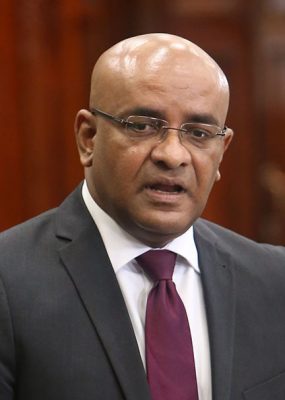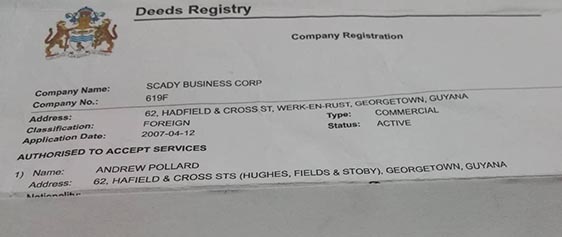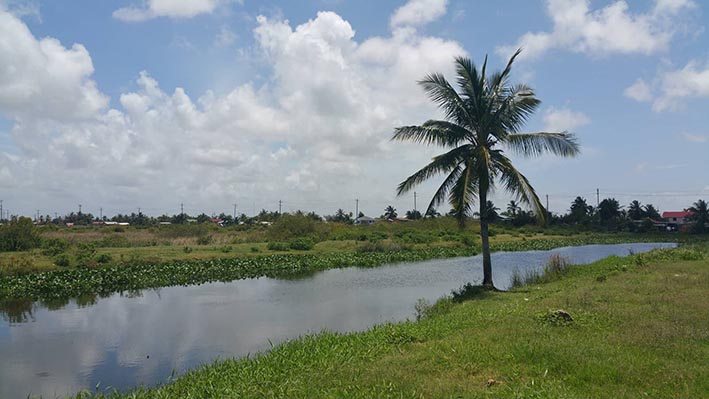A decade after 4.7 acres of land at Liliendaal, East Coast Demerara, was controversially sold to Russian aluminium company Rusal, purportedly for the construction of a vacation home for its president Oleg Deripaska, it remains neglected and there has been no word on plans for its development.
The land was sold to Rusal upon a directive by former President Bharrat Jagdeo and the sale has since become the subject of the court case brought against former Finance Minister Dr. Ashni Singh and former head of the National Industrial and Commercial Investments Limited (NICIL) Winston Brassington.
Both men were recently charged in their absence with three counts of misconduct in public office.

Among the joint charges was that in 2008 while Singh was the Minister of Finance and Chairman of NICIL, he sold a 4.7-acre tract of land, lettered RU and XXX, being a portion of Plantation Liliendaal, East Coast Demerara which is the property of Guyana for the sum of $150 million to Scady Business Corporation, while knowing that the property was valued at $340 million when valued by Rodrigues Architects’ asset valuation officer.
How NICIL came to sell the land is still to be answered as the property should have fallen under government lands after being “Given to the government of Guyana via deed of gift dated 27-05-2003 by the Guyana Sugar Corporation Ltd.” That would mean that it was the Guyana Lands and Surveys Department that should have been the agency responsible to undertake the transaction as per the Lands Department Act.
Jagdeo has said that both Singh and Brassington carried out the transaction in accordance with decisions made by his Cabinet.
Justifying the decisions taken, the former PPP/C president said that a recommendation was made on the matters by the Privatisation Board, which was sent to Cabinet for approval. Approval was given and the matters were referred back to the Privatisation Board and the Unit for implementation.

He explained that all of the sales went through a transparent process and were among the compilation of sales under his government that was prepared by the Privatisation Unit and submitted to the National Assembly.
But while he gave detailed explanations of the two other sales over which the two men were charged, Jagdeo referred to the Scady purchase as “the other case,” only saying that, that “it was sold for $23 million an acre,” which works out to a $108.1 million sale price.
However, court records state that $150 million was paid, while NICIL’s “Privatization in Tables: Phase II – 1993-2011,” which was prepared by Brassington in 2012, shows that it was sold for $115 million, which was paid to NICIL by Scady Business Corporation.
The document has no date of when the transaction occurred but gives a summary of how the lands were sold to the company.
“Third bidder was selected after withdrawal of the 1st highest bidder given the submission of its detailed development plan for the setting up of its banking headquarters. The 2nd highest bidder had submitted a half page narrative with no details of its serious business intentions of proof of financing,” it states.
It also pointed out that in 2012, that matter was “currently engaging the attention of the courts.” It is unclear if the second highest bidder had challenged the decision of selling the land to Scady.
Scady Business Corporation was incorporated here on April 12th, 2007 as a foreign company and authorised now Senior Counsel Andrew Pollard to accept services on its behalf. It is still listed as an active company at the Commercial and Deeds Registry.
When contacted, Pollard said that he is just the service agent for the company as is required under the Companies Act and could give no information on the transaction.
The only information on the company is that it is Russian-owned and that it is registered offshore in the British Virgin Islands.
And while the NICIL and court documents list Scady Business Corporation as the buyer, documents for the sale of the land were prepared for Rusal.
Surveying of the land was also done for Rusal and the processing of all of the transactions were completed in less than two weeks. “The purpose of the survey is to demarcate Tract RU to allow for conveyancing of title to Rusal Mining Company Ltd,” a sale document states.

Sources knowledgeable of the transaction told this newspaper that the intended purposes of the land was to build a vacation home Deripaska, who is a friend of Jagdeo.
Asked why the land was never developed, a source said “the main issue was that it was paid for. If the man did not wish to build as yet, it is his land.”
But locals purchasing land from government have been pressured to start works or be subjected to it being repossessed regardless of it is paid for in full, according to the terms of the purchase.
A recent visit to the property by Sunday Stabroek found that it is covered by bush. Persons in the area said the land used to be used for grazing cows but persons have stopped in recent years.
The US government added Deripaska to its sanctions blacklist in retaliation for Russian interference in the US general elections of 2016. He was added to the list of seven Russian oligarchs, 12 companies they own or control, as well as 17 senior Russian government officials because the US said they were profiting from a Russian state engaged in “malign activities” around the world.
Reuters has reported that Deripaska said that the US’ decision to impose sanctions on him was “groundless, ridiculous and absurd.”
But the move triggered the worst financial crisis Rusal has faced, with its stocks and bonds tumbling and even Rusal’s operations here feeling the impact, with workers uncertain of the future.
The US has said it said it would consider lifting the sanctions on Rusal altogether if it severs ties with Deripaska.

